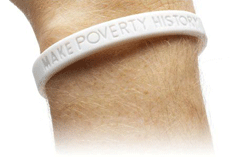
The Make Poverty History Campaign, together with the Live-8 concerts around the world, is once again focusing the world's attention on Africa at this week's G-8 gathering in Scotland. Twenty years after the famous Live-Aid concerts for famine relief, Africa remains impoverished and the spotlighted remedies are still full of shortcomings.
In fact, the whole spectacle of the G-8 nations' concern for the plight of Africa is mired in hypocrisy, beyond the fact that the trendy white wristbands were apparently being manufactured by sweatshop labour in China
The stark ads with celebrities snapping their fingers to indicate the monotony of continuous child deaths from hunger are indeed compelling and powerful. It is, further, very positive that the star-studded anti-poverty campaign highlights the critical issues of debt and unfair trade, while also spotlighting child poverty here in Canada.
Credible dishonesty?
But the larger discussion surrounding Africa - especially the sound bites coming from the likes of Bush, Blair and Martin - is too often patronizing, incomplete and even dishonest.
The whole official discussion around the plight of Africa is rooted firmly in the discourse of charity. And like Naomi Klein and others have so eloquently pointed out, the Global South does not need charity. It needs liberation from the neo-liberal economic regime, and from the neo-colonial military and political regimes that are systematically stealing its wealth and starving its people.
Contrary to the widespread notion of an infantilized Africa needing only "more attention" from the West, the continent has a rich history of struggle against the Western powers for independence and economic justice. South Africa's anti-apartheid movement, which gained worldwide solidarity in the 1980s, is best known, but hardly alone in terms of strivings for genuine independence.
Poor people, rich land
The history of the Democratic Republic of the Congo - known as Zaire during thirty-some years of dictatorship under Mobutu Sese Seku - points to a more realistic diagnosis for Africa's poverty than simple neglect: the people are so poor, because the land is so rich, to paraphrase Uruguayan author Eduardo Galeano's take on the resource rich corners of Latin America.
Patrice Lumumba, the Congo's only democratically-elected prime minister, was murdered with the support of Belgian and U.S. operatives, for daring to envision an independent country that kept some, if not all, of the proceeds of its resource wealth for its own people.
Lumumba - like Ken Saro-Wiwa, leader of the Ogoni struggle against Shell Oil - was killed for daring to assert economic independence from the West. Death is the punishment that has met so many who have dared to upset the imbalance of the world's resource allocation upon which modern neo-colonialism rests.
Maintain 'disparity'
Back in 1948, famous Cold War American diplomat George Kennan bluntly explained the real U.S. objectives in world affairs:
"We have about 50% of the world's wealth but only 6.3% of its population ...our real task in the coming period is to...maintain this position of disparity. We should cease to talk about such vague and unreal objectives as human rights, the raising of living standards and democratization."
Peace and social justice activists have been busy these past few years protesting the naked imperialism in the Middle East, from the U.S.-led invasion of Iraq, to the Wall that is concretizing apartheid in Palestine. We might do well, though, to pay some more attention to Africa, where the U.S. military is busy manoeuvring to monopolize - you guessed it - oil and natural gas reserves.
'Rotting footprint'
In fact, the U.S. already imports 15 percent of its oil from West Africa, and that figure is expected to rise. The U.S. Navy is considering setting up a base on the tiny island of Sao Tome, for instance, to help secure newly discovered oil fields in the Gulf of Guinea.
The citizens of the G-8 countries are consuming more than our fair share and leaving an oversized, rotting footprint on the earth. And there is a very real and very explicit economic system that is structured in such a way as to maintain and entrench this disparity.
The fashionable discourse of charity and "saving Africa," then, only confirms all of the feelings of largesse and superiority that some in the North need to feel, without mentioning the darkness that's still very much there at the heart of modern-day imperialism.
Charity plus
It would be far more substantial than charitable concerts and sentiments -- and far more unsettling to the most privileged - if a movement were to be constructed around the idea of northern responsibility and complicity in the starvation of the children of the South.
So yes, give the aid: 0.7% percent of GDP, sure. But, beyond that, remove the strings of neo-liberal restructuring that the aid is so often linked to, and cancel the foreign debts of Africa and the rest of the so-called Third World. And not just a portion of it either, but the whole usurious and asphyxiating debt.
Once that monumental boot on the neck is lifted off, the world can begin a discussion about reparations for all that was stolen, confiscated and destroyed during the various colonial occupations and decades of unfair trade.
Paying the ecological, financial and moral debt that the western world owes Africa could really make poverty history, but it first requires an honest look at the history, and moving beyond the impoverished rhetoric of noblesse oblige and charity.
Itrath Syed is a graduate student in Women's Studies at the University of British Columbia and long-time social justice activist. Derrick O'Keefe is an editor of the weekly on-line journal Seven Oaks Magazine. ![]()














Tyee Commenting Guidelines
Comments that violate guidelines risk being deleted, and violations may result in a temporary or permanent user ban. Maintain the spirit of good conversation to stay in the discussion.
*Please note The Tyee is not a forum for spreading misinformation about COVID-19, denying its existence or minimizing its risk to public health.
Do:
Do not: